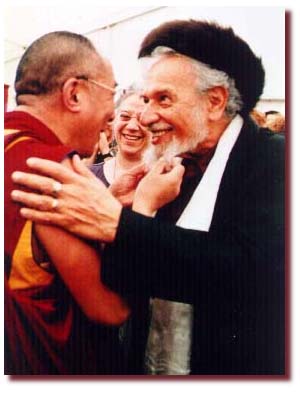Joseph Adler
- Links for Interreligious Dialogue
- Syllabus:
Senior Seminar: Interreligious Dialogue
Prof. Joseph Adler Fall 1998
Ascension 310 Mon. 7:30-10:00
E-mail ADLERJ Ascension 120
PBX 5290 Office hours: T/Th 2-4, W/F 11-12
- "Interreligious dialogue" refers to the engaged discussion and
consideration of ways in which members of different religious traditions can learn about each
other, learn from each other, and learn about themselves. It is a movement, or group of movements,
that has become increasingly prominent in religious and scholarly circles in the past two decades.
This semester we will read and discuss representative works by and about participants in Buddhist-Christian,
Buddhist-Jewish, Confucian-Christian, Hindu-Christian, Hindu-Muslim, and Jewish-Christian dialogue.
In early October we will be visited by Prof. John Berthrong, Associate Dean of the Boston University
School of Theology and Director of its Institute for Dialogue among Religious Traditions.
READING
Available in Bookstore:
Wilfrid Cantwell Smith, The Meaning and End of Religion
Paul O. Ingram and Frederick J. Streng, eds., Buddhist-Christian Dialogue: Mutual Renewal and Transformation
Rodger Kamenetz, The Jew in the Lotus: a Poet's Rediscovery of Jewish Identity in Buddhist India
Richard W. Rousseau, ed., Christianity and Judaism: The Deepening Dialogue
Harold Coward, ed., Hindu-Christian Dialogue: Perspectives and Encounters
Paul F. Knitter, One Earth, Many Religions: Multifaith Dialogue and Global ResponsibilityOn Course Reserve [CR]:
John H. Berthrong, All Under Heaven: Transforming Paradigms in Confucian-Christian Dialogue
Eugene J. Fisher, A. James Rudin, and Marc H.Tanenbaum, eds., Twenty Years of Jewish-Catholic Relations
Hans Kung and Julia Ching, Christianity and Chinese Religions
Peter K.H. Lee, ed. Confucian-Christian Encounters in Historical and Contemporary Perspective
Donald K. Swearer, Dialogue: The Key to Understanding Other Religions
Leonard Swidler, ed., Muslims in Dialogue : The Evolution of a Dialogue
COURSE REQUIREMENTS AND GRADING
1. Participation (20%). This is a seminar, and a senior seminar at that, so it is expected that everyone will actively participate in discussion on a regular basis. Attendance is required, and unexcused absences will be penalized.
2. Weekly summaries and questions (40%). At each seminar meeting you will turn in a list of three central points of the week's reading and three critical questions that you have regarding it. These questions can arise from points you did not understand, or points that could be considered further, or points on which you disagree with the author, etc. Both the central points and the critical questions should be fairly concise, but elaborated to some extent. At this point I imagine them to be about one or two pages each in length. Please turn them in as two separate documents stapled together, and bring two copies to class - one for you to read from and one for me. The two lowest grades will be dropped.
3. Two Critical Reviews (40%). For most seminar meetings, two students will be responsible for writing critical reviews (3-5 pages) of the week's reading and leading the discussion (and will not have to turn in summaries and questions). Each of you will do this twice. You will be graded on both the written paper and your oral presentation.
SEMINAR SCHEDULE
1. 8/31
Introduction
Senior exercise
Seminar topic
Library orientation
2. 9/7
Comparative Perspective Smith, The Meaning and End of Religion
3. 9/14
History of Dialogue Swearer, Dialogue: The Key to Understanding Other Religions [CR], ch. 1
"Declaration on the Relation of the Church to Non-Christian Religions: Nostra Aetate" [handout]
Berthrong, All Under Heaven [CR], pp. 58-64 
4. 9/21
Buddhist-Jewish Dialogue Kamenetz, The Jew in the Lotus
The Dalai Lama and Zalman Schachter
5-6. 9/28
Buddhist-Christian Dialogue
6. 10/5Swidler, "A Jerusalem-Tokyo Bridge " [handout]
Ingram and Streng, Buddhist-Christian Dialogue, ch. 1 (Buri),
ch. 4 (Ingram)Ingram and Streng, Buddhist-Christian Dialogue, ch. 7 (Abe),
ch. 8 (King), ch. 9 (Streng)
7. 10/12
Confucian-Christian Dialogue
With Prof. John Berthrong, Boston University.
Prof. Berthrong's public talk will be Monday in Peirce Lounge at 4:15.
8. 10/19Kung and Ching, Christianity and Chinese Religions, pp. 59-127
Lee, Confucian-Christian Encounters [CR], pp. 68-81(Liu), 82-106 (Martinson), 274-291 (Neville), 473-479 (Berling)Jewish-Christian Dialogue
9. 10/26Vatican documents [handouts]: (1) Nostra Aetate (1965), (2) "Guidelines and Suggestions for Implementing the Conciliar Declaration Nostra Aetate" (1974), (3) "Notes on the Correct Way to Present the Jews and Judaism in Preaching and Catechesis in the Roman Catholic Church" (1985)
Rousseau, Christianity and Judaism, Introduction (Rousseau), chs. 1 (Eckardt), 2 (Culbertson), 4 (Rottenberg), 12 (Seigman)
Fisher, Rudin and Tanenbaum, Twenty Years of Jewish-Catholic Relations [CR], pp. 9-60
(articles by Rudin, Higgins, and Tanenbaum)
10. 11/2
Hindu-Christian Dialogue
11-12. 11/9-16Coward, Hindu-Christian Dialogue, Foreword (Panikkar), Introduction (Coward), chs. 6 (Sharpe), 7 (Taylor), 10 (Neufeldt), 11 (Thompson), 18 (Kostermaier)
Hindu-Muslim Dialogue
Muslim-Christian Dialogue
Muslim-Jewish Dialogue Swidler, Muslims in Dialogue [CR], chs. TBA
13. 11/30
Interreligious Dialogue and the Ecological Crisis Knitter, One Earth, Many Religions
14. 12/7
Discussion of the Religion Major with faculty, and refreshments, at my house: 202 W. Brooklyn St.
Return